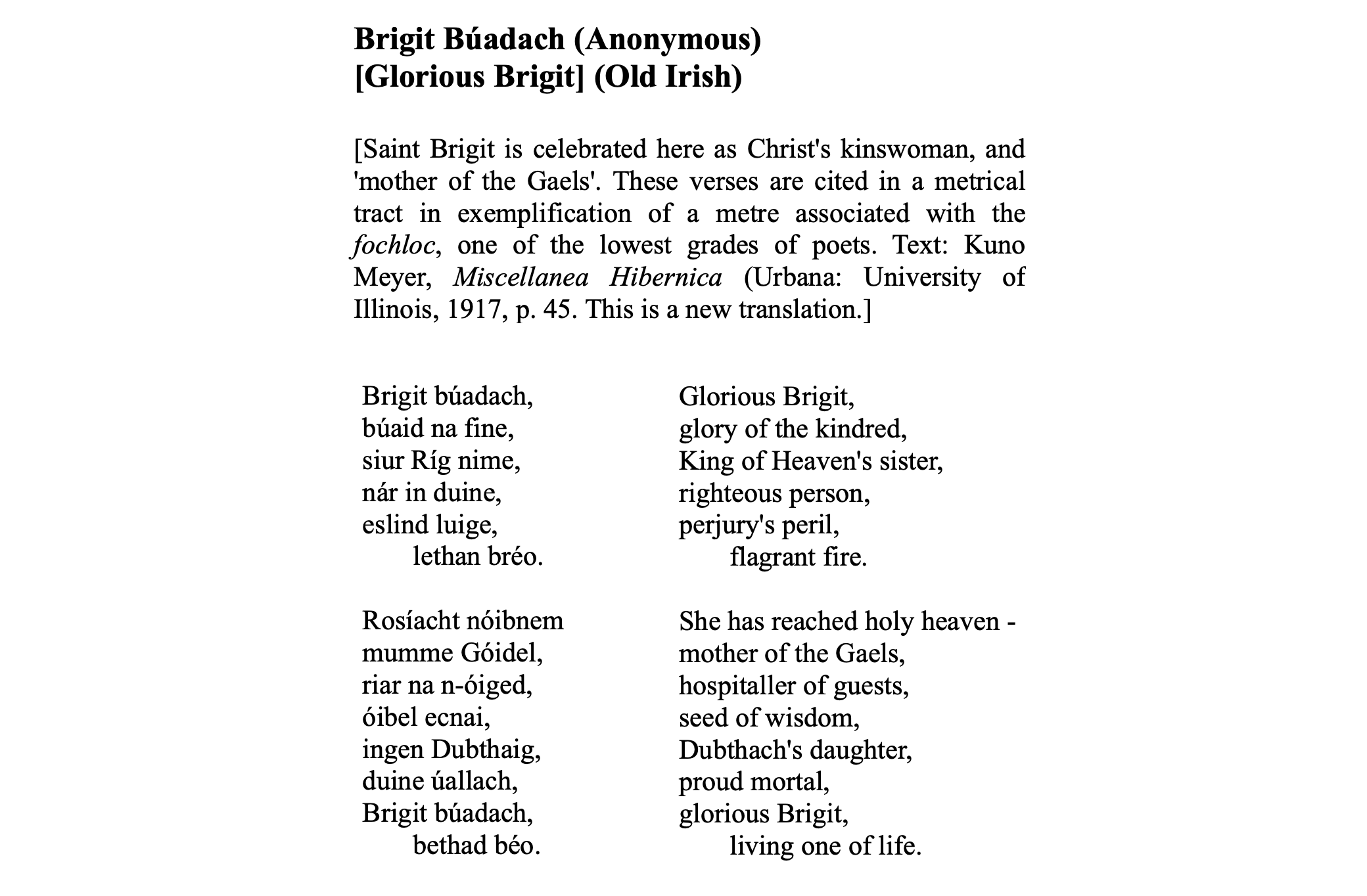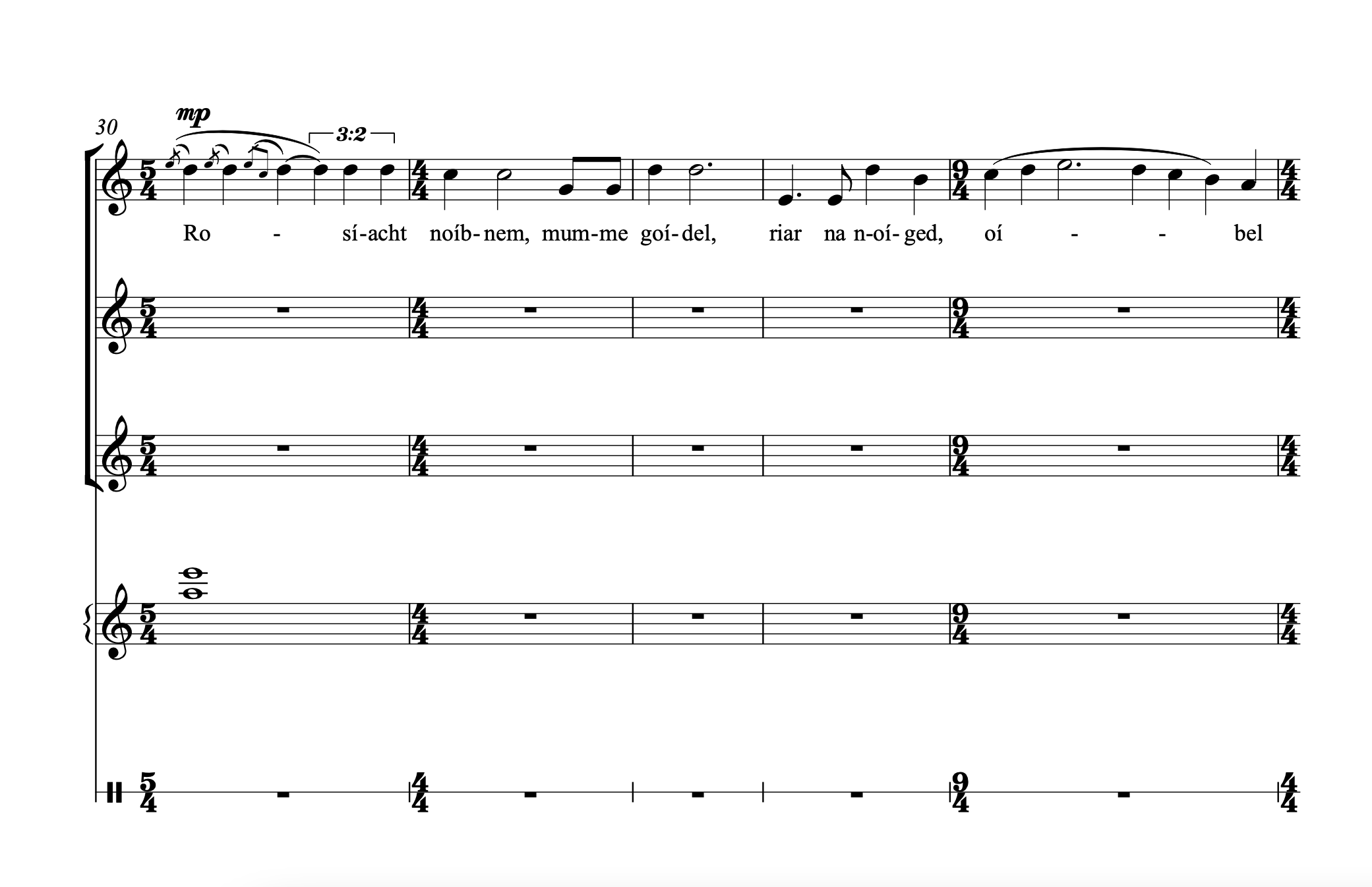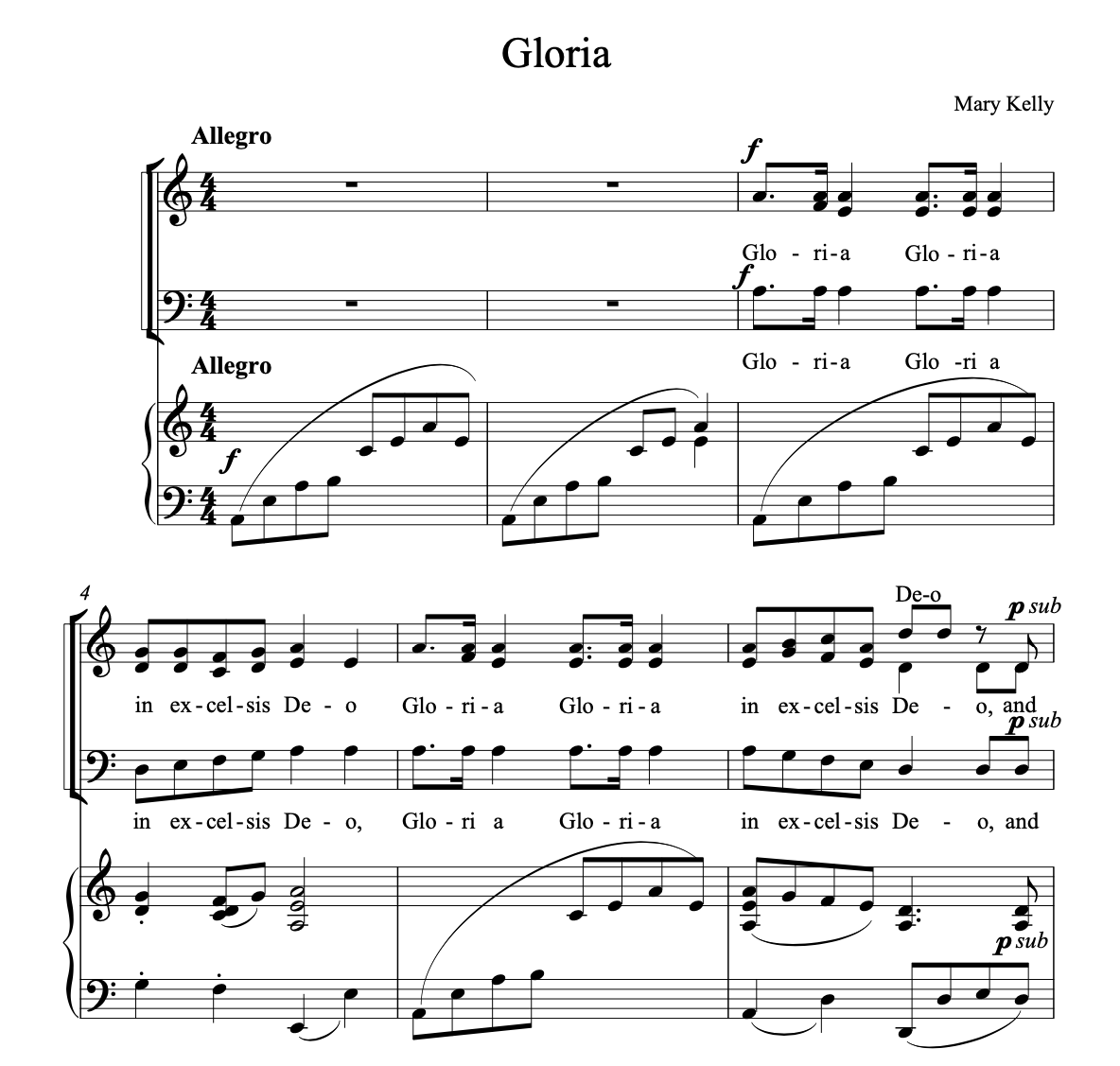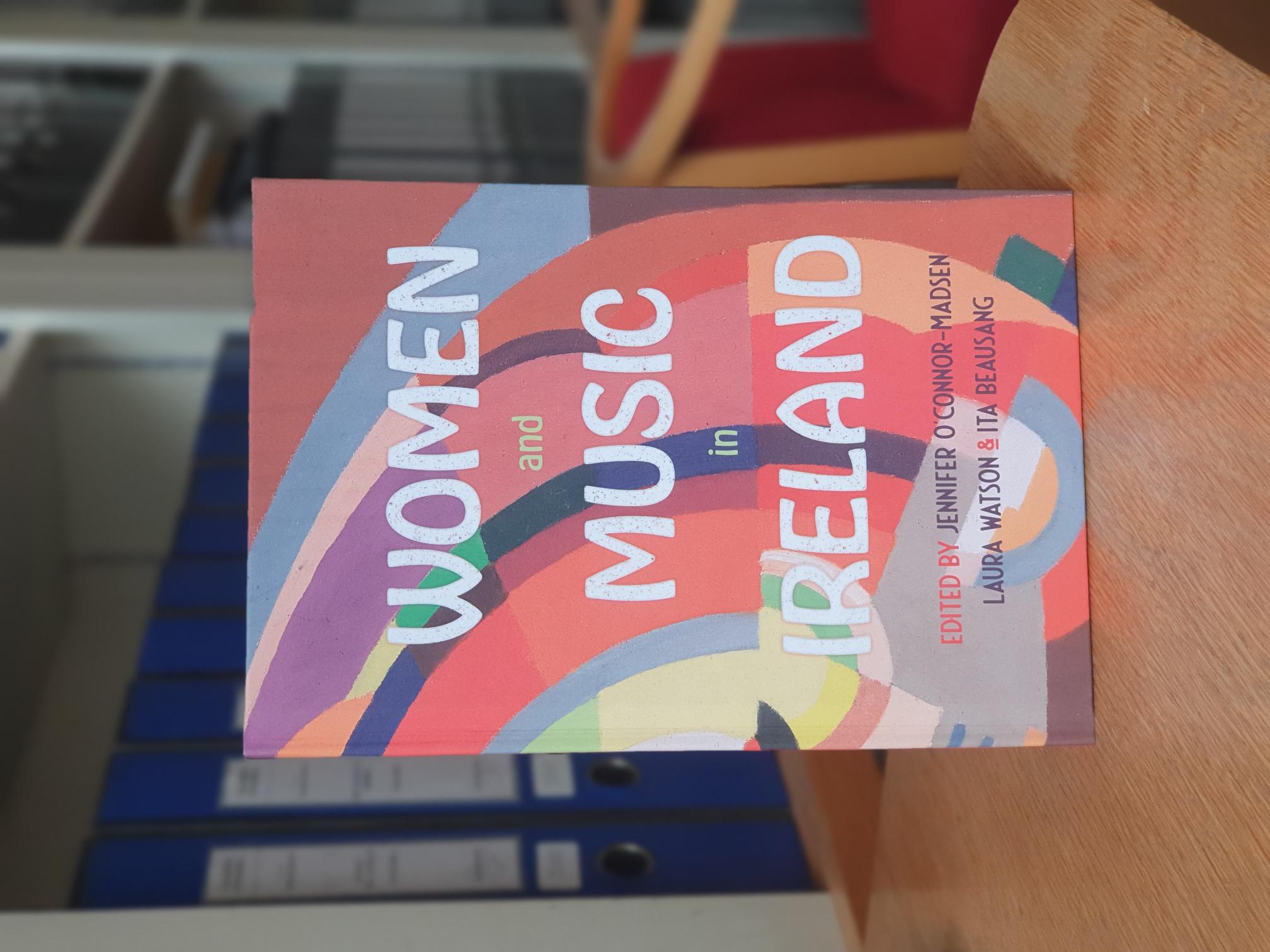Through the Digital Door: Lá Fhéile Bríde
This special edition of Through the Digital Door celebrates St. Brigid's Day (Lá Fhéile Bríde) and the festival known as Imbolc. Imbolc signals an end to the darkness of Winter and a welcoming of the new light of Spring. In honour of this time of year, we are highlighting works composed for Brigid and the traditions associated with her from a selection of CMC composers.
Amhrán Naomh Bhríghid
Eibhlís Farrell is from Rostrevor in Co. Down. Her works cover a wide range of media and have been performed and broadcast throughout Europe and America. She has represented Ireland at the UNESCO International Rostrum of Composers and has been guest composer at many international festivals and conferences.
Farrell composed Amhrán Naomh Bhríghid in 2014 as part of a concert dedicated to St. Brigid. It was commissioned by the singer Sharon Lyons and was first performed in 2014 in the pro-Cathedral in Dublin by Sharon Lyons and a group from Limerick University Women's choir. The work is set to an early anonymous poem in Old Irish:
As referenced in the first verse, Brigid is often associated with fire. A sacred fire, dating back to pre-Christian Ireland, burned in Kildare and scholars suggest that this was to invoke a goddess named Brigid to protect their herds.
Programme notes for Amhrán Naomh Bhríghid:
Amhrán Naomh Bhríghid (2014) is written for solo soprano, SSA female chorus, glockenspiel and tambourine. The chant-like, gently waving choral sections with their static harmonic patterning are contrasted against the spiralling solo soprano line and highlighted by the pointillistic use of tambourine and glockenspiel. The textural writing remains clear and constant throughout underpinning the composer’s interpretation of the work as a spiritual lullaby invoking the qualities of grace and empathy associated with Naomh Bríghid.
Click on the play button below to hear a sample recording of this piece
The sample recording begins on page 3 of the score. We hear the glockenspiel and tambourine clearing the way for the soprano to begin the second verse from bar 30:
Mass of St. Brigid
Mary Kelly was born in Dublin in 1957. She gained a BMus from UCD in 1978. Her output includes chamber, choral and solo instrumental music. Her music has been performed and broadcast in many European countries, in Russia and in the USA. She studied composition with James Wilson (Dublin), Robert Saxton (London) and David Dramm (Amsterdam).
Kelly composed Mass of St. Brigid in 2009. The work is for mixed choir and has 6 movements; Kyrie, Gloria, Alleluia, Sanctus, Amen and Agnus Dei. It is dedicated to the students, staff and parents of Ballinteer Community School on the occassion of the opening of their new school on 12 October 2009.
St. Brigid founded many convents all over Ireland. She also founded a school of art, including metal work and illumination, over which St. Conleth presided. On writing this Mass for Ballinteer Community School, Mary Kelly says,
I wrote this Mass to mark the formal opening of the new school building at Ballinteer Community School where I was, at the time, directing the school choir. I chose St. Brigid as there is Brigidine engagement in the school. In addition to the female characteristics of charity and hospitality, Brigid was assertive and a strong leader. Her feast day, February 1st marks the first day of the Celtic Spring. I particularly love this time of year with its promise of brighter days, birds beginning to nest and new growth shooting up.
Click on the play button below to hear the Choir of Ballinteer Community School, conducted by Mary Kelly, singing the second movement, 'Gloria'
See below the first page of the second movement:
Saoirdhréacht Gaedhealach (Gaelic Fantasy)
Rhoda Coghill was born in Dublin. She began her musical studies as a pianist, studying with Patricia Read in the Leinster School of Music before continuing with Arthur Schnabel in Berlin. As a student she won many prizes in piano and composition at the Féis Ceol. She became the official accompanist in Radio Éireann in 1939 and remained in the post until 1969.
As cited in The Dictionary of Irish Biography;
Apart from the orchestral rhapsody, most of Coghill's other compositions are songs, dating from 1923–41, which reveal a sensitive and atmospheric voice ... She stopped composing in the early 1940s, possibly because her modesty as a practising quaker prevented her from promoting her own work.
Saint Brigid is also known as Muire na nGael or Mary of the Gael. Brigid was born in the year 451 near Dundalk to a pagan Gaelic Chieftain named Dubtach and to a Christian slave mother named Brocca (also Brocessa or Brocseach). In honour of Brigid's Gaelic heritage, the last work that we are highlighting here is Saoirdhréacht Gaedhealach (Gaelic Fantasy).
Saoirdhréacht Gaedhealach (Gaelic Fantasy) for piano was composed by Rhoda Coghill in 1935. However, a recording of this piece, performed by Deborah Grimmett, marks the premiere recording and may be the first commercial recording of any of Coghill's compositions.
You can hear Saoirdhréacht Gaedhealach (Gaelic Fantasy) performed by Deborah Grimmett and featured on her album Lineage: Tracing Influence by clicking the play button below:
Saoirdhréacht Gaedhealach (Gaelic Fantasy) weaves three traditional Irish tunes together - Lament for Hugh Reynolds and Hither and Thither airs and Tipsy House reel. In the liner notes of the album, Deborah Grimmett describes Coghill's composition as
true to the character of the original tunes, while seamlessly marrying them with her own unique harmonic compositional language.
Many of Ireland's great women composers are featured in the newly released book Women and Music in Ireland and Rhoda Cogill is among them. This book is now available to reference at the CMC library.





